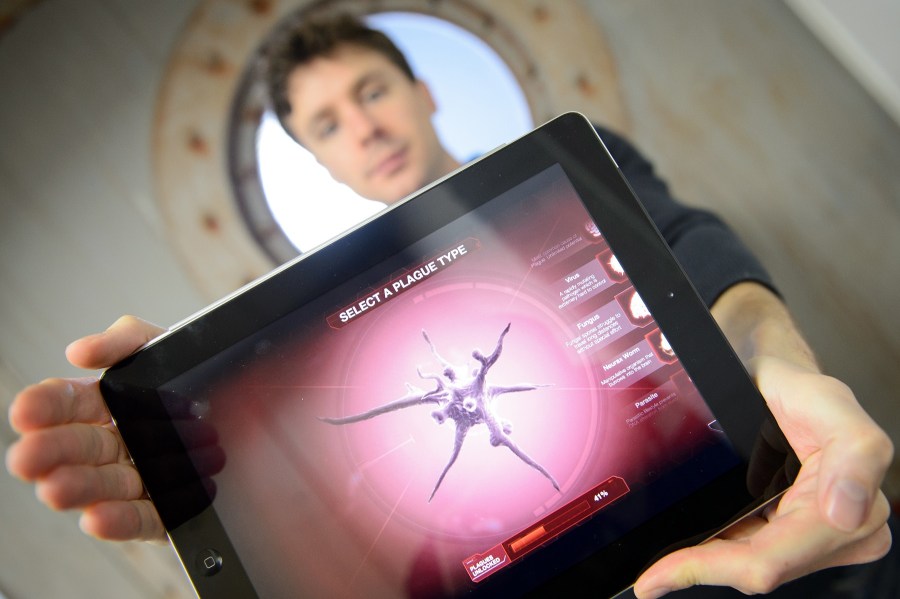Virus video games are suddenly more popular than ever

The coronavirus continues to have a huge impact on China’s economy, as businesses, factories and stores are shut and travel restricted. With so many people staying home quarantined, they’re going online to entertain themselves. Health and fitness apps are seeing surges in downloads, and video games are seeing a real leap in popularity. The strategy simulation game Plague Inc. jumped recently to the top of Apple’s App Store for games in China.
I spoke with Marketplace’s media reporter Jasmine Garsd, who said it’s one that’s eerily similar to the real-life situation that people are finding themselves in. The following is an edited transcript of our conversation.
Jasmine Garsd: It is a game that is about a decade old, and the creator of the game recently said, “Every time there’s an epidemic, every time there’s an outbreak, people get really interested in the game, and [we] see usership go up. But please remember that this is not some blueprint for how to deal with the Wuhan virus. Go to the [Centers for Disease Control and Prevention] website.”
Jack Stewart: Are there any ways in which video games could be educational if there are that many people turning to them at the moment?
Garsd: Actually, with the game Plague Inc., James Vaughan, the founder of Ndemic Creations, did a lot of research about epidemiology, and the CDC expressed interest in what applications — real-world applications and educational applications — these games could have. There’s also an incident that I’m totally fascinated by. Back in 2005, the game World of Warcraft, one of the bad guys, in order to make him cause more damage, they gave him a virus, and he would give the virus to anyone in close proximity. What happened is, in World of Warcraft, you can transport to other parts, either riding an animal or you can just transport — much like we can take airplanes. What ended up happening was a full-on [virtual] epidemic. The company had to impose a quarantine on players’ [avatars]. This was called the “corrupted blood incident.”
Stewart: Is there anything they can take away from that specific example and apply it to the real world?
Garsd: One of the most interesting takeaways was with models, these mathematical models, that epidemiologists form, [and that] don’t always take into consideration human nature. One of the epidemiologists I spoke to [mentioned] the issue of curiosity — people going to a site of infection because they’re curious about what’s happening, or aid workers or journalists. That happened a lot in this World of Warcraft epidemic. You would get players who would just log in to go take a quick look at the epidemic and they would get infected. Epidemiologists did papers [that said], “We should consider irrational behavior in these mathematical models.”

Related links: More insight from Jack Stewart
For more on what investors are doing to take advantage of the surge in apps and online games, check out the Reuters report. I guess where there’s crisis, there’s opportunity. Shares in game publishers and video platforms in China have all been ticking up in price pretty strongly.
You might remember other attempts to use online behavior to track the spread of infectious diseases. Google Flu Trends and Google Dengue Trends are no longer working, though they sought to track the spread of those illnesses by tracking people searching for symptoms. It was an idea called nowcasting, but it didn’t work. As Wired explained a few years ago, it provides an insight into the potential — but also the limits — of big data.
I mentioned that fitness apps were surging in popularity in China, presumably because they allow people to exercise indoors at home. I’m guessing sneaker sales are not doing so well there. But there was some good news recently for Nike and its Vaporfly shoes — the ones that we told you about around a week ago that the World Athletics was considering banning. Despite tightened regulations around what some are calling “technology doping,” the high-tech shoes will be allowed in the upcoming Tokyo Olympics. Check out Fast Company for an interview with Nike’s head of design responding to that.
And check out our podcast if you missed the episode, where we took a deep dive into how the shoes enable athletes to run 4% faster.
The future of this podcast starts with you.
Every day, the “Marketplace Tech” team demystifies the digital economy with stories that explore more than just Big Tech. We’re committed to covering topics that matter to you and the world around us, diving deep into how technology intersects with climate change, inequity, and disinformation.
As part of a nonprofit newsroom, we’re counting on listeners like you to keep this public service paywall-free and available to all.
Support “Marketplace Tech” in any amount today and become a partner in our mission.


















